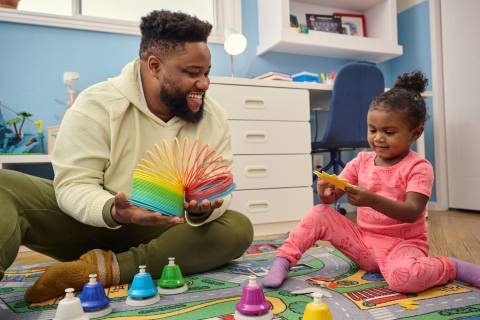Gaining communication and language skills is one of the most important parts of early childhood development. For caregivers of children who aren’t meeting language milestones, it can be concerning. However, there are many different steps caregivers can take to help with language development.

Every child’s development is different, and milestones are only general guidelines. Pediatricians and researchers are also still understanding the impacts that the COVID-19 pandemic might have had on early childhood development. These general guidelines are designed to be a starting point to help you gauge where your child is at in their development. If they are a little bit behind or ahead, there’s typically no cause for concern. But some key indicators could suggest possible issues with language development:
By 12 months, your child isn’t babbling at all, such as making simple sounds like “ba,” “da,” “ma,” and “ga.”
By 16–18 months, your child hasn’t said any words.
By 2 years, your child has difficulty understanding simple instructions.
By 2 years, your child doesn’t have a vocabulary of around 50 words. A much smaller vocabulary could suggest a language development concern.
By 24–30 months, your child is struggling to form two-word phrases.
Past the age of 3, your child has trouble properly pronouncing words. While it’s normal for young children to make some pronunciation errors, ongoing issues could indicate a speech-language concern.
Your child has difficulty engaging with others, making eye contact, or understanding nonverbal cues. This can sometimes be associated with language delays or other developmental concerns.
Your child begins to lose previously gained language skills. This could be a cause for concern and requires professional evaluation.
It’s important to remember that each child develops at their own pace, and some may reach these milestones a bit earlier or later than others. These milestones are general guidelines. If you are growing concerned that your child’s language development is not progressing, there are many different steps you can take to help:
Observe and document: Keep track of your child’s language and communication skills, and note any specific challenges, progress, or reversals in progress. This information can be valuable when discussing concerns with professionals and can help you recognize patterns.
Create more communication opportunities: Regularly talking, singing, and reading together are great ways to help with language development. Check out these resources where you can access free books.
Monitor hearing: Hearing issues can impact language development. If you’re concerned about any hearing difficulties, schedule a hearing test with your child’s pediatrician.
Encourage other social interactions: Provide opportunities for your child to practice communication skills in different social settings, like with their friends and with other trusted adults and family members.
Seek professional advice: Consult your child’s pediatrician to discuss your concerns. They might recommend further assessment or refer you to a speech-language pathologist.
Early intervention: If your child needs additional support, early intervention programs can be beneficial. These programs offer specialized services to address developmental delays and improve language skills. The California Department of Developmental Services offers Early Start, a free early intervention program for infants and toddlers with developmental delays or developmental disabilities. Early Start services are available statewide and are provided in a coordinated, family-centered system.
Many children develop language skills outside of traditional milestones. As much as possible, show patience and understanding while continuing to encourage your child to use their words to express themselves.






